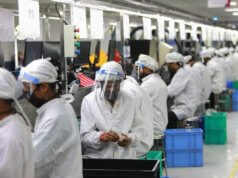The Indian solar manufacturing industry is being crippled by the predatory trade practices of China and a few other countries.
At a recent industry briefing in New Delhi, the Indian Solar Manufacturers’ Association said that more than 70 per cent of the domestic installed photovoltaic capacity remained idle and a significant number of people in the industry were losing their jobs due to below cost dumping.
Estimating the loss to Indian solar manufacturers because of cheap imports at over Rs.1,000 crore, the representative body of 25 domestic solar manufacturers claimed thin film and silicon PV cells and modules imported into the country from USA and several Asian countries were being sold at extremely low prices bleeding the domestic industry. It pointed out that along with domestic cell and module manufacturers, the industry that supplied glass for making solar modules was also getting adversely impacted because of the imports.
The European Union recently imposed anti-dumping duty of around 48 per cent on Chinese solar imports. In December 2012, the US Commerce Department had imposed anti-dumping duties ranging from 29.18 per cent to 254.66 per cent on solar cells imported from China.
The domestic solar manufacturers said they were hopeful the government would impose suitable anti-dumping duty to eliminate below cost dumping in the country. In January 2013, the Ministry of Commerce had issued a gazette notification for launch of anti-dumping investigations into import of PV cells from China, Taiwan, Malaysia and the USA.
ISMA cautioned that failure on the government’s part to check dumping might make the solar manufacturing industry dependent on imports thereby posing a threat to the country’s energy security. The depreciation of the rupee, as witnessed in FY 2014, could harm the interest of JNNSM in such a scenario, it added.
Besides large scale deployment of solar power across the country, one of the key objectives of JNNSM is to develop domestic manufacturing capacity across the entire value chain. The DCR has been introduced with the aim of achieving that objective. Globally, as many as 13 countries including USA, South Africa, China and several in Europe and the Middle East require solar farms to install locally manufactured equipment to ensure energy security and for employment generation.











